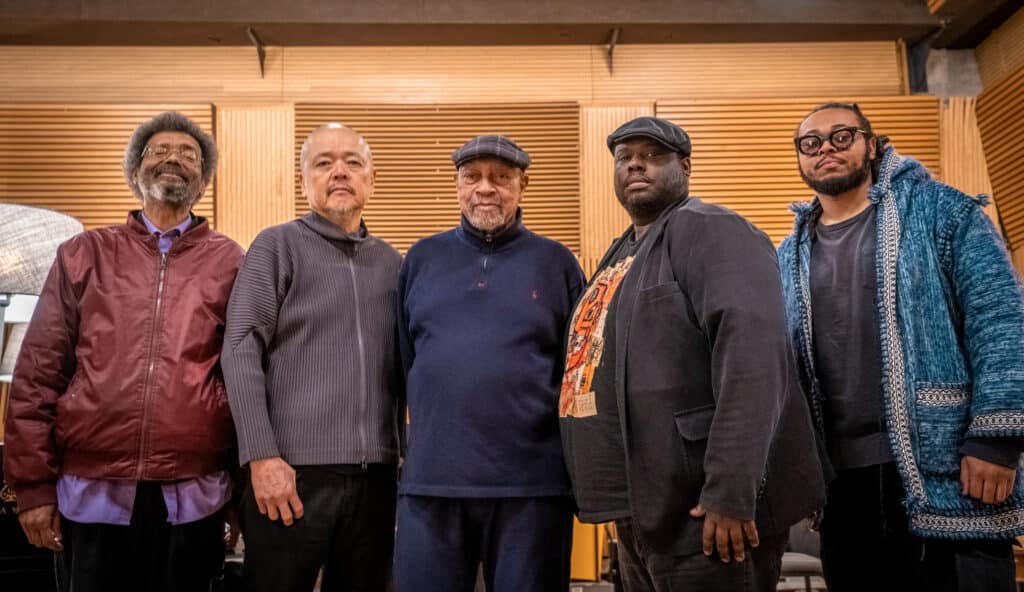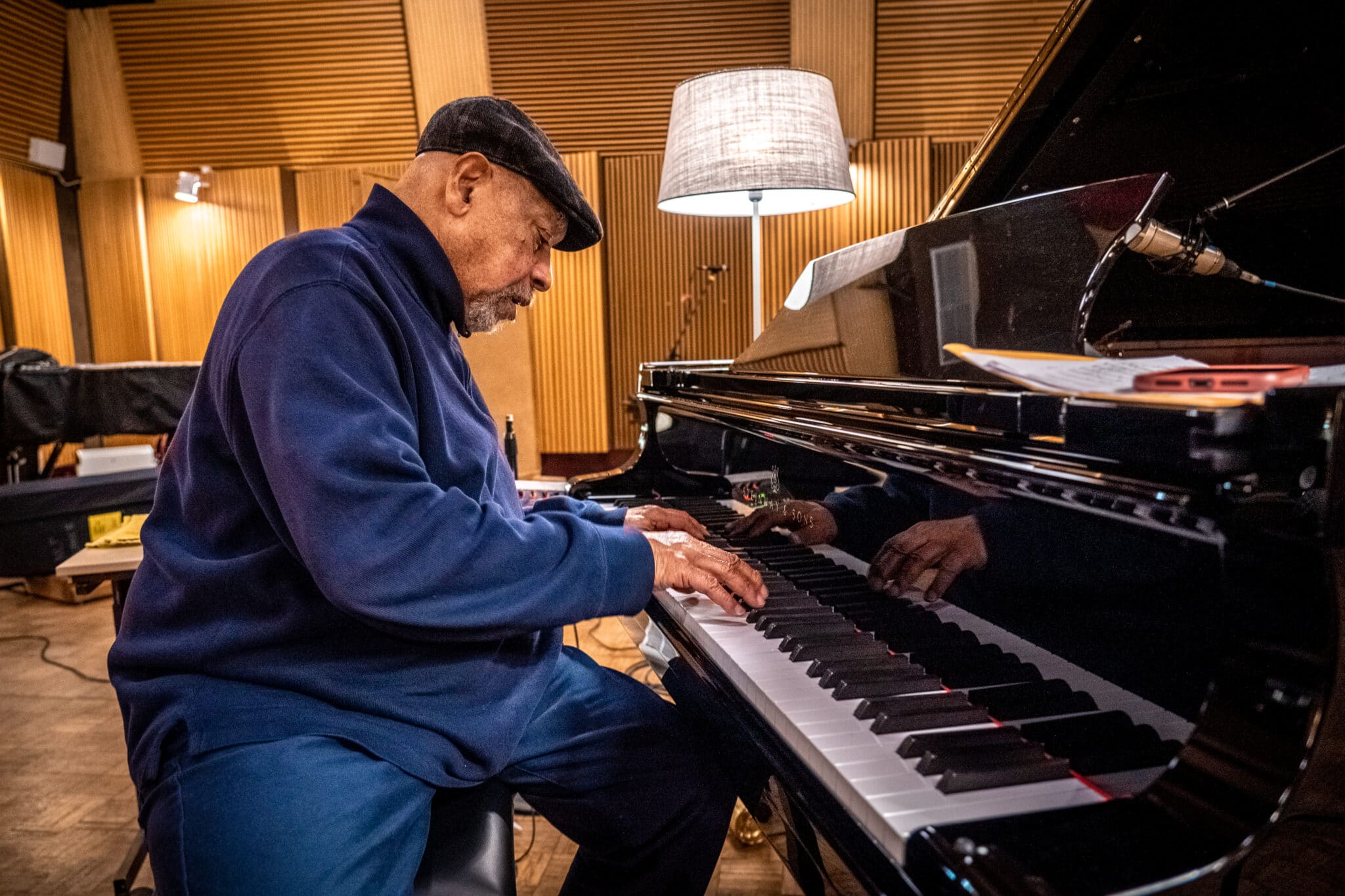The following is an interview between jazz journalist Morgan Enos and pianist/composer Kenny Barron: an NEA Jazz Master, a 13-time GRAMMY nominee, and a DownBeat Hall of Famer. His new album, Beyond this Place, features alto saxophonist Immanuel Wilkins, vibraphonist Steve Nelson, bassist Kiyoshi Kitagawa, and drummer Johnathan Blake. It will be released 10 May.
“Take your time, you know? Just take your time.”
That’s Kenny Barron’s advice to just about any young player, no matter their instrument or level of prowess (which utterly bears out in Barron’s work). But one young player didn’t need it.
Immanuel Wilkins, who’s made waves as a bandleader on Blue Note, has an “exciting” flair – Barron’s word. Yet he could play the hell out of a ballad, which Barron regards as a crucible for any musician worth their salt.
“A lot of that comes with age. When you’re young – and I was guilty of the same thing – you want to play everything, all the time,” Barron tells UK Jazz News. “Dizzy once said, ‘As you get older, you learn what not to play.’”
Barron’s new quintet album, Beyond this Place, is proof positive of the power of space. On originals like Barron’s “Innocent” and standards like “Softly as in a Morning Sunrise,” Barron, Wilkins, Steve Nelson, Kiyoshi Kitagawa, and Jonathan Blake gorgeously play off each other’s sounds and silences.
Read on for an interview with Barron about how the album came to be.
UK Jazz News: How’d the Beyond this Place band come together?
Kenny Barron: I was travelling with this group. I have two quintets; that’s the second quintet. The music is totally different from the first, original quintet. But I had heard Immanuel somewhere; I don’t remember where it was. And I just fell in love with his playing.
And then, Steve Nelson, I’ve known since he was a student at Rutgers University in the mid-’70s. So, we’ve been friends. I know his playing. I’ve known him for a long time; I thought it would be a great combination.
I wrote some music, and then pulled some things out of the vault. And we were very happy with the results.
UKJN: What specifically do you think makes this band pop, chemistry-wise?
KB: It’s hard to say, but I think the playing of Immanuel and Steve is a good combination. They don’t play alike. Immanuel can be a very exciting player, and very different. Steve is a little more settled; he’s a little older. Immanuel’s 20-something! Steve is about close to 70, so there’s a big difference.
The music, and the way they play, is obviously informed by their ages and experiences.
UKJN: I think they’ll write books about Immanuel. What makes him special to you, perhaps from the vantage point of your generation?
KB: Well, first of all, he’s a very exciting player. With the band, we do some really crazy stuff.
But the thing that really got me: we did a ballad, “The Nearness of You.” For me, that was a true test, because he knew how to leave space. He knew how to take his time. For me, if you know how to play a ballad, you’ve passed the test.
Plus, playing that song, he reminded me so much of Johnny Hodges. His beautiful, soft, sweet sound, and taking space. Sometimes, young people forget that space is a part of music.

UKJN: How did you come to master space in your playing?
KB: Well, first of all, my influences. That’s what I learned from them.
My biggest influence on piano was Tommy Flanagan. When I was in junior high school, I fell in love with him. And the reason I fell in love with him, first of all, was his touch. A very light touch, a delicate touch. The way he played the solos, and the lines he played – his use of space.
In other words, he told a story when he played. It wasn’t just a lot of notes. Those are things I learned between Tommy and Hank Jones; how to leave space.
UKJN: Can you speak to the choice of material on Beyond This Place, and why the tunes commingle well?
KB: Well, most of it’s original stuff. The title song, “Beyond this Place”, had a kind of spiritual quality to it. That’s how the title came to be. I’ve actually written lyrics for it, so you may hear that song.
This one piece, “Tragic Magic,” is an original; it’s actually pretty old. I think I only recorded it one time. So, there was something in the vault, so to speak.
“Sunset” was on my very first recording, [1973’s Sunset to Dawn], in the ‘70s. Sometimes, I will record something, and for years, I won’t play it. But I thought it was time to just pull it out and see what happens.
UKJN: Johnathan Blake is one of my favourite drummers on the New York scene. He’s like quiet thunder. What do you appreciate about him?
KB: First of all, he’s able to do just about anything. If you want to play some funk, he can do that; if you want to play out, he can do that. Play straight ahead, he can do that.
But he’s very sensitive, and part of that is because he’s also a composer. [On the album], we actually recorded one of his pieces, called “Blues on Stratford Road.” He knows how to think and play compositionally.
He knows what it takes, so I love him. He’s been with me for almost 20 years.
UKJN: Kiyoshi has a similar sensitivity.
KB: Well, he’s been with me for 30 years!
UKJN: Tell me about covering Monk’s “We See.”
KB: We wanted to do something as a duo, just the piano and saxophone. It was actually Immanuel who said, “Why don’t we try this?” It’s a piece I used to play a long time ago; we had a band called Sphere with [saxophonist] Charlie Rouse and [drummer] Ben Riley. When that situation with the duo [came up], I said, “Yeah, let’s do that!”
UKJN: What’s the state of your piano thinking?
KB: Well, I’m 81 years old. I’m still looking; I’m still searching. The whole idea is to play better.
It’s not about technique, because it’s what you do with the technique that you have. Sometimes, you search for things, and it doesn’t happen. But that’s OK. You don’t always find what you’re looking for. But that’s just part of a search, and searching is a good thing.



2 responses